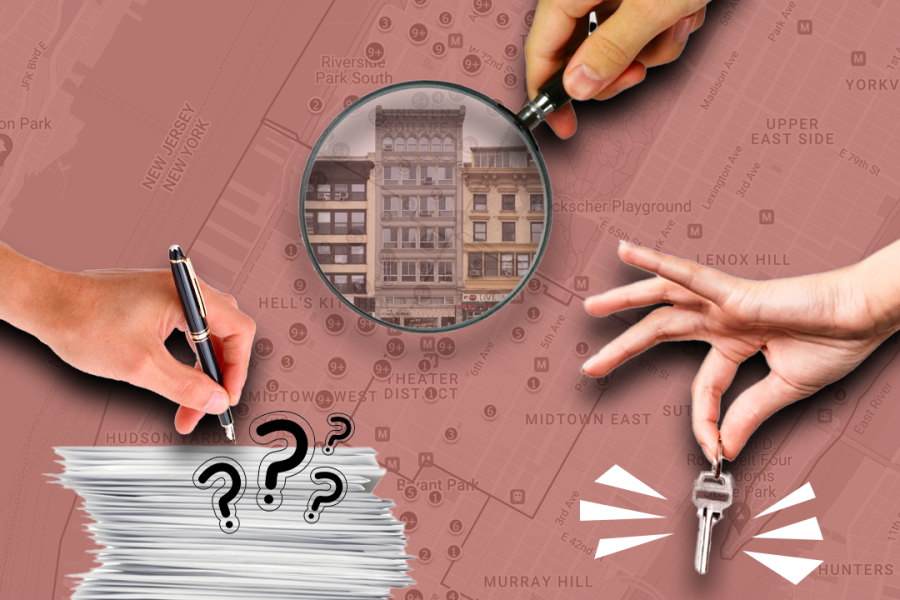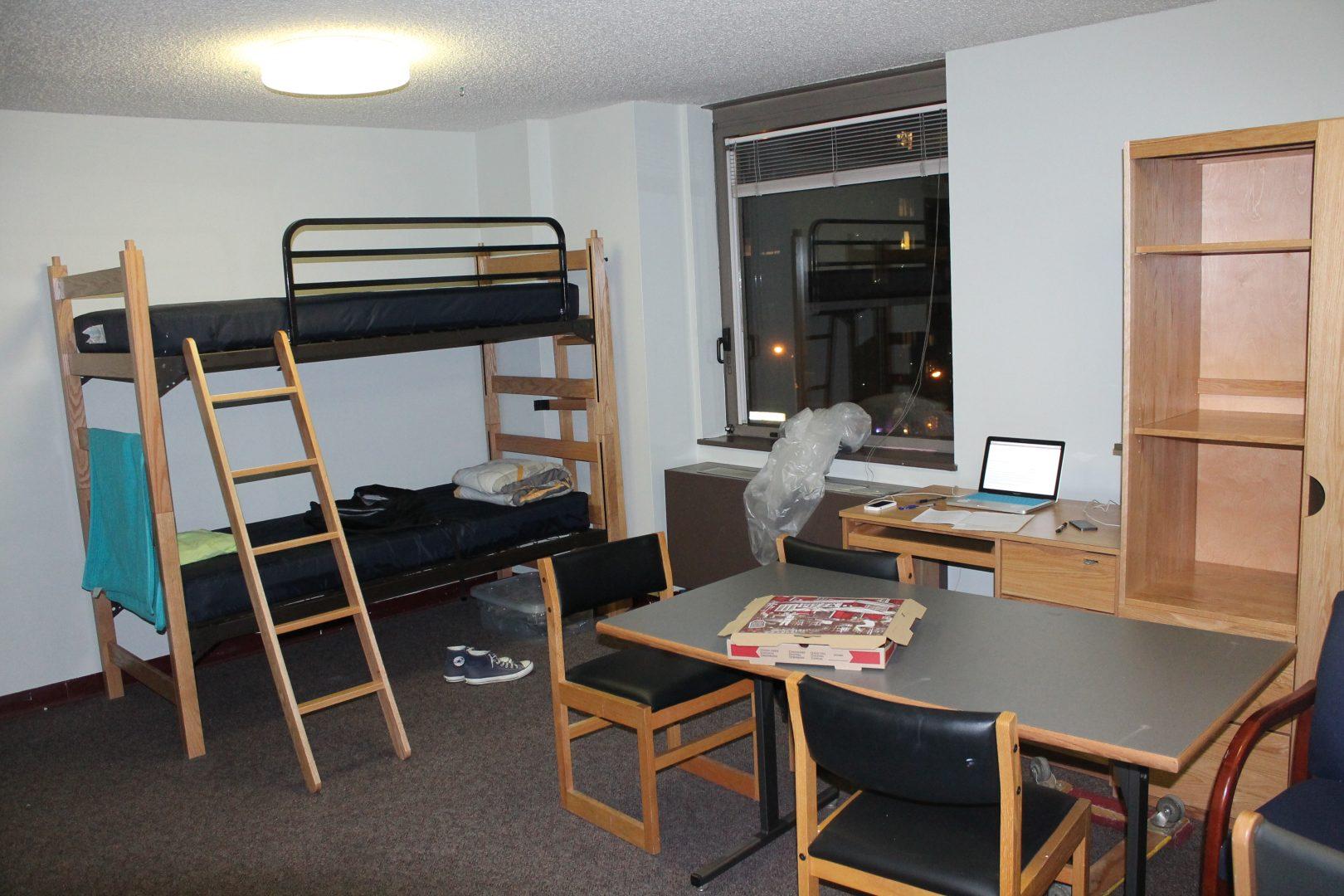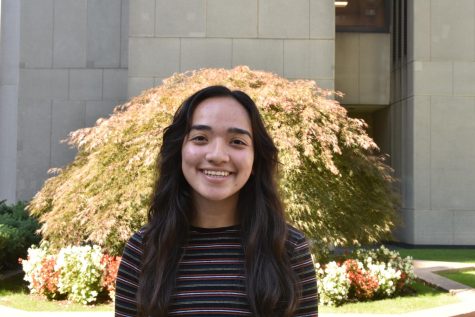House Hunting in New York City: A Definitive Guide
Finding an affordable apartment in New York City is difficult, but not impossible
August 16, 2022
After seeing a $9,000 charge on my e-bill for the fall 2021 semester, I knew immediately that I wanted to live off campus the following school year. Paying almost $2,600 per month (for each of the three and a half months a semester that students are allowed to live in McMahon Hall) and still having to share a bedroom and live with five other people seemed ridiculous. This thought process is not uncommon, as half of all Lincoln Center students choose to live off campus.
There is so much I wish I knew before deciding to move off campus. It’s no secret that New York City housing is a scam. With its excessively high prices and apartments rapidly flying off the market, it seems almost impossible to find affordable housing, let alone an apartment that seems worth its exorbitant price. If you’re wondering whether or not you should live off campus, I would say that it is a personal choice that all comes down to what compromises you are willing to make in a home. But before you make that decision, here are a few things I wish I knew about the house-hunting process before moving off campus.
Affording an Apartment
It is important that you set a realistic budget when looking for apartments and do your best to stick to it. My three roommates and I started our search with the goal of finding a place that is, at the bare minimum, cheaper than staying in McMahon but preferably much lower.
While not technically impossible, finding an apartment within walking distance to campus that costs less than living in McMahon is very difficult. If being close to campus is a must for you, you may need to consider a higher budget. But if you are willing to commute a bit (my friends and I searched on the Upper West Side and in Morningside Heights), you can probably find a cheaper apartment.
It is also important that you understand the income requirements for an apartment. Most apartments require that tenants make a combined 40x the rent each year — so if your rent is $2,000 a month, you and any roommates are expected to collectively earn $80,000 a year. Since most full-time students do not earn this salary, you will likely need a guarantor.
A guarantor is someone who signs onto a lease and agrees to take on financial responsibility for the tenant. Guarantors sign a lease to guarantee to a landlord that rent will be paid if the tenant cannot afford to do so. A guarantor is often a parent but can be any U.S. citizen in good financial standing. Some apartments may require a guarantor to live in New York or a surrounding state, but it is worth checking in with each individual landlord.
Since having a guarantor means that a tenant is unable to meet the financial expectations for an apartment on their own, landlords often require more from guarantors. While different apartments may have different requirements, most landlords expect the guarantors signing a lease to earn a combined 80x the monthly rent or to have other assets.
If you are looking to live with one or multiple roommates, make sure the apartment will accept multiple guarantors.
There are third-party organizations that can serve as guarantors if you are an international student or if you are unable to find another guarantor. You should do your research before working with one, as they can cost students extra in the long run and are not accepted by all apartments. If you are looking to live with one or multiple roommates, make sure the apartment will accept multiple guarantors. It is important to look at what different apartments expect from their tenants before you decide whether or not to move off campus.
Searching for an Apartment
Once you’ve decided how much you are willing to spend, it is time to look for an available apartment. You should start your search about six weeks before you are looking to move, but it can never hurt to start early to get a better idea of what you are looking for and what you can get within your budget.
There are dozens of online apartment search tools, but the premier one in New York is StreetEasy. Units listed on StreetEasy are updated more often than on other websites. In my personal experience, realtors are more likely to respond to StreetEasy inquiries than other websites, but it can’t hurt to look at additional websites such as Zillow and Apartments.com. As a word of caution for any apartment listing platform, beware of units that are listed as available but have been off the market for months.
It is also important to note whether or not a listing has a broker’s fee. In other, more affordable cities, landlords often pay realtors by giving them the first month of a tenant’s rent, but that is not always the case in New York. Apartments with broker’s fees require tenants, rather than the landlord, to pay the realtor before signing a lease. These fees are often listed as one-to-two month’s rent or sometimes as a percentage of annual rent. For example, if an apartment is listed as $2,000 a month and has a 15% broker’s fee, your annual rent would be $24,000, and before moving in, you would have to pay your realtor 15% of this, or $3,600.
In most other cities, unless a listing states otherwise, you should assume that it has a broker’s fee, but you can narrow your search on most sites to include only no-fee apartments.
Get as much information as you can from a listing, and if you find an apartment you are interested in, ask the realtor every question you have. It is important to have an idea of how long the listing has been on the market for, when you can move in, if the unit accepts guarantors, if laundry is available and if any utilities are included in the rent. Do not assume these factors will remain constant from place to place. Once you have confirmed these details, set up a tour of the apartment. Never sign a lease for an apartment you haven’t seen.
Most staged photos and videos in a listing are taken with flattering lighting and angles to make the apartment seem nicer, so beware of false listings that end up nothing like the real apartment.
I would recommend bringing a friend to see each apartment and taking lots of photos, videos and measurements while touring. Most staged photos and videos in a listing are taken with flattering lighting and angles to make the apartment seem nicer, so beware of false listings that end up nothing like the real apartment. This is illegal, and you can report them for false advertising.
Applying
If you are interested in applying to an apartment after seeing it, be prepared to move quickly! While it is important to take time to decide whether or not an apartment is right for you, you should be ready to apply immediately after touring a unit if you like it.
The application requirements can be different for each apartment, but in general, each tenant and guarantor should be prepared to each supply an application (provided by the management company), at least three recent pay stubs and bank statements, a letter of verification from an employer or a certification of enrollment for students, a credit score report, a copy of your photo ID, your and your guarantor’s most recent tax returns and W2s, and any other documents that can prove you are in good financial standing for the apartment.
The sheer amount of personal information that apartments require sounds overwhelming now, but landlords use it to make sure that you will be able to afford rent. It can’t hurt to start gathering these materials as soon as you begin the house hunting process. Once you have a folder of all these documents, you’ll be much more prepared to apply.
Some apartments will also require a “good faith deposit” with a tenant’s application, which can range from a couple hundred to over a thousand dollars.
Most apartments require an application fee for each applicant and sometimes for each guarantor as well. This fee covers the cost of background checks and any other information landlords need to find before accepting an application. The fee can range from about $10-$30 per application and is often nonrefundable, even if your application is not accepted.
Some apartments will also require a “good faith deposit” with a tenant’s application, which can range from a couple hundred to over a thousand dollars. This shows a landlord that a prospective tenant is serious about moving forward with a unit. This deposit should be counted toward your first month’s rent or security deposit if your application is accepted and should be fully refundable if your application is rejected for any reason. If this is not the case, do not apply for the apartment.
Finally, keep in mind that if your application is accepted, you will be expected to pay your first month’s rent, your security deposit (a deposit that is often equal to one month of rent and is refundable in full or in part at the end of your lease, provided the apartment does not sustain any damage during your occupancy) and, if applicable, a broker’s fee all at once. This can be a large expense up front, so take this cost into consideration when deciding whether or not a place is right for you.
If this guide hasn’t scared you off, I wish you nothing but the best in your apartment search! Whether you live on or off campus, New York City housing is unaffordable for most, and there is no quick fix or easy out when it comes to living in the city. If you do decide to move off campus, remember to keep your eyes open for scams, and if something doesn’t seem quite right, trust your intuition.
My apartment-hunting process has been miserably stressful, but I am so happy and relieved to say that I finally signed the lease on a place I can call my own. The New York City housing market is not accessible to most people, and frankly, my roommates and I are privileged to be able to somewhat afford a place in the city. Fordham needs to have more on-campus housing options at prices that college students can actually afford because there is no cheap way to live in the city.
It should not be unaffordable to live in the city where we go to school. I’ve heard many horror stories about how difficult it is to find an apartment in New York, but I discovered that many elements of apartment hunting in New York are exclusive, arbitrary and not applicable in other cities. That being said, don’t pack your bags and move to New Jersey just yet. Finding a place to live in New York City will never be easy, but as long as you know what you’re getting yourself into, you’ll be able to find a place that you can call home.
















Barry • Sep 9, 2022 at 10:14 am
Thank you,
I was wondering if you knew how to report false advertising for listings? This has been way too prevalent this past summer.
Jordan • Sep 5, 2022 at 5:57 pm
This is so good. I wish I had this when I was apartment hunting as a student!